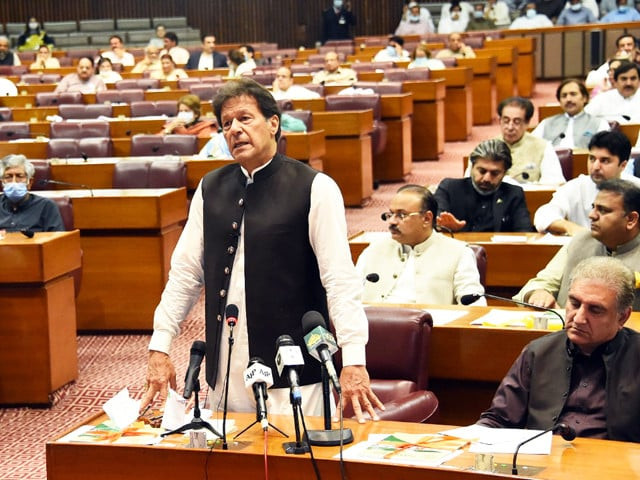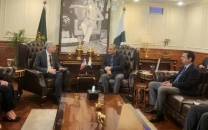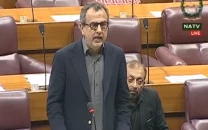Imran invites opposition to work out electoral reforms
PM says Pakistan can be partners with US in peace, never in conflict

Prime Minister Imran Khan offered an olive branch to the opposition parties on Wednesday and invited them to sit with the government with the aim to improve and reform the electoral process for the sake of the future of democracy.
Amid a rare hushed din in the opposition benches after days of bickering and chaos, Prime Minister Imran addressed the National Assembly, dilating on almost all the major issues facing the country and unfolding his priorities to address them.
Imran addressed a convivial house a day after the National Assembly passed the budget with a majority vote. He spoke about the issues of national importance, including his government’s vision of a welfare state, budget, economic policy, foreign policy challenges as well as the situation in Afghanistan.
Key opposition figures, including Opposition Leader Shehbaz Sharif, Pakistan Peoples Party (PPP) Chairman Bilawal Bhutto and former president Asif Ali Zardari, were not present, dealing a blow to the opposition’s manoeuvrings to challenge the prime minister.
However, Pakistan Muslim League-Nawaz (PML-N) leader Rana Sanaullah, Khawaja Saad Rafique, PPP stalwart Raja Pervaiz Ashraf and Maulana Asad Mehmood of Jamiat Ulema-e-Islam-Fazl (JUI-F) were among the few opposition leaders present during the speech.
Electoral reforms
During his wide-ranging address, a confident-looking PM ignored the faint protest by the opposition which, at times, also thumped the desks in unison with the treasury benches – a rare sign of approval – as Imran continued to assert some of his positions, including his stance on electoral reforms.
The prime minister pointed out that every election after 1970 had been controversial due to allegations of rigging, therefore, “the only solution to this issue [allegations of electoral fraud] is the use of EVMs [electronic voting machines]”.
“We are striving to improve the election process. We have proposed election reforms and I will request the opposition to sit with the government, as it pertains to the future of democracy in Pakistan,” he told the house. “If they [opposition] have any reservations, we are ready to hear them out.”
Imran referred to his 21 years of cricketing experience and said the controversies of defeat and victory in the international cricket only ended after the introduction of neutral empires and the support of modern technology.
He also mentioned the campaign of the Pakistan Tehrik-e-Insaf (PTI) after the 2013 general elections, when his party wanted the audit of only four constituencies, but the then government did not accept the demand and later the matter was decided by the court.
War on terror
Continuing with his address, the prime minister questioned as to why Pakistan joined the US in the war on terrorism. He asked if there was any other country, which became involved in another country’s war and lost 70,000 lives.
“What did we have to do with the war [against terrorism]? “What they [the US] said, we kept doing. [Former military ruler Pervez] Musharraf said in his book that he took money,” he said, adding that the US then asked Pakistan to send its army into the tribal areas but what was achieved by doing so?
“We decided to become America's front-line state, [which was] the most humiliating thing to do in life. Joining America in the war is a great folly. When I said why should we be part of the war of others and sacrifice the lives of our people … I was called Taliban Khan,” he added.
Drone attacks
Continuing, the prime minister said that US drone strikes were carried out with the permission of the Pakistani governments “which our governments kept hiding”. He asked: “Our terrorist has been sitting in London for 30 years, will Britain allow us to launch a drone strike in London to kill him? Never.”
From this, the prime minister said, “we have learned a lesson that this nation should never compromise on its sovereignty” for fear of anyone. “I have flatly refused to give the US a military base. We will remain partners in peace with the US, and will always remain so, but we cannot be partners in conflict.”
When Prime Minister Imran Khan spoke about the United States during his address, members of the JUI-F from the opposition benches also applauded him while the slogans of Allah Akbar were heard from the government benches.
Imran said it was not the outside world that “humiliated us but we ourselves humiliated us”. He stated that the “Kalima ‘La Ilaha Illallah’ gives us pride and dignity,” adding that no country could rise without honour. “Whoever bows down to Allah, will not bow down to any superpower.”
The prime minister told the house that peace in Afghanistan was in Pakistan’s interest but stressed that the country did not need “strategic depth” in its neighbour. “We do not want strategic depth in Afghanistan. We are thinking ahead; we are thinking of the economy, links with Central Asia and we share strong ties with those countries. We are now thinking of the future.”
Ties with India
Imran reiterated Pakistan’s support and solidarity with the oppressed people of Indian Illegally Occupied Jammu and Kashmir (IIOJK). “No diplomatic relations will be re-established with India until New Delhi reversed the steps of August 5 [2019].”
Read more: PPP to boycott joint-opposition meeting
Budget and economy
Imran appreciated Finance Minister Shaukat Tarin and the government’s economic team for presenting a people-friendly budget, which he said reflected his vision of Pakistan. He thanked the party lawmakers and the allies for approving the budget.
When the PTI came to power, The prime minister said, the current account was in the negative and the country was losing foreign exchange at a rapid rate. He added that his government tried not to approach the International Monetary Fund (IMF), because of its harsh conditions.
He thanked China, the United Arab Emirates (UAE) and Saudi Arabia for coming to Pakistan’s aid in difficult situation, which saved the country from default. However, later, he said, the government had to approach the IMF to fulfil the country’s fiscal needs.
Despite the inherited major challenges including the $20 billion of current account deficit and the fear of default, the government stabilised economy through inevitable hard decisions which also hit the common man, he said.
He referred to the similar situation faced by Turkey before President Recep Tayyip Erogan put their economy on track through corrective measures. “Times come in the history of nations when they have to face hardships for the sake of country.”
State of Madina
Imran said when he founded the PTI 25 years ago, his vision for a welfare state was in accordance with Nazaria-e-Pakistan and the Objectives Resolution, which the country’s founding fathers had dreamt for on the basis of the principles of Riasat-e-Madinah, the first welfare state in the world.
He said history was witness to the fact that it were the strong principles of Riasat-e-Madinah, established by Holy Prophet Muhammad (Peace Be Upon Him), which led to the fall of big Roman and Persian empires only 13 years later.
However, the prime minister added, when the Muslim world abandoned those principles, they declined; subsequently Europe emerged and came up by following the principles of the welfare state.
He said that since the PTI was founded on the basis of three principles ie justice, humanity and self-esteem, which was also included in the party’s vision statement, and he wanted the budget to reflect that vision.
Covid pandemic
The prime minister also mentioned his government’s successful strategy of dealing with the Covid-19 pandemic, which helped recover the country from the negative economic effects of the pandemic that impacted the whole world.
He said that the government’s decision of early opening the construction, agriculture and exports sectors also helped in realisation of around 4% economic growth despite the Covid-19 challenge. The government provided financial support to 12 million families through Ehsaas Programme.
He said that by the grace of Allah Almighty, the country despite the challenge of locust attack achieved record wheat, rice, maize and sugarcane production, which besides helping achieve economic growth also led to economic prosperity in rural areas.
The prime minister said that the government’s measures to ensure the receipt of support prices by the growers of various crops also led to economic prosperity of the farmers, who then reinvested their incomes in the next crops.
Imran mentioned 17% growth in exports during FY 2020-21 and 9% growth in the Large-Scale Manufacturing (LSM). He added that the government was focusing on export-led industries, including the Small and Medium Enterprises (SMEs) to further boost exports.
To boost the agriculture sector, Imran said, Kissan Card scheme was being introduced in Punjab. It was for the first time that farmers would be provided direct support through Kissan Card, he said. Small farmers, which make 70% of the country’s farming community, would be provided direct subsidy besides opening of Kissan Markets on China’s model, he added.
Imran mentioned the unprecedented allocation of Rs500 billion for “Kamyab Pakistan” programme. He said that the PTI governments in Punjab, Khyber Pakhtunkhawa and Gilgit-Baltistan were providing universal health insurance through Health Card, which will also be launched in Balochistan.
Imran again referred to the principles of the State of Madina and said if Pakistan had to move ahead and achieve progress, it would have to follow those principles. China achieved development and steered 700 million people out of poverty in 35 years by taking care of the weaker segments of society, he added.
He said that as the government cannot establish hospitals across the country, the universal health insurance scheme would help boost the country’s medical facilities by private sector in rural areas. Duty-free import of medical equipment has also been allowed for that purpose, he added.
He said that in order to help the poor families, the government will arrange free technical training of one person from every poor family. He also said that 4 million families have been included in the government’s low-cost housing scheme which was meant for labourers and low-income groups.
Speaking about the construction industry, Imran said that the government held negotiations with the sector and provided them with incentives as 30 related industries are linked to the sector and provide income and employment to a large number of people.
Rule of law
“Our direction is correct and we are moving towards a welfare state,” Imran said. Under the law and the treatment for the weaker and powerful should be same. Any society or country cannot achieve progress without the rule of law,” he remarked. “Pakistan is now moving towards a welfare state.”
Explaining that it was in the interest of the nation to expand the tax base, Imran said that the only way to not approach the institutions such as the IMF was not to evade taxes. “A committee will be formed under the finance minister and those who wilfully evade taxes would be jailed,” he added.
“When a prime minister steals money and sends it abroad, the country goes to ruins. The country is destroyed by the corruption of the prime ministers and the ministers, and not of the clerks. A civilised country cannot function unless the big corrupt people are caught,” he said.
Imran mentioned that when NAB went to arrest a lawmaker from Sindh the other day, they beaten. He added that when the encroached government land in Lahore was vacated, it was termed victimisation and oppression.
“For the first time, NAB is getting hold of big corrupt people, so there is a hue and cry that the NAB is bad. In the past, when they were not touched, everyone was silent,” the prime minister stated. “The rule of law is the foundation of a society.”
Imran also mentioned the issue of salaries of the parliamentary employees raised by Speaker Asad Qaiser to which Tarin had said it could only be approved by the prime minister. However, Imran said: “I am not a king who can announce an increase all at once. I am, too, bound by the law to seek permission from the finance ministry”. At this, the house echoed with laughter.
(WITH INPUT FROM APP)


















COMMENTS
Comments are moderated and generally will be posted if they are on-topic and not abusive.
For more information, please see our Comments FAQ